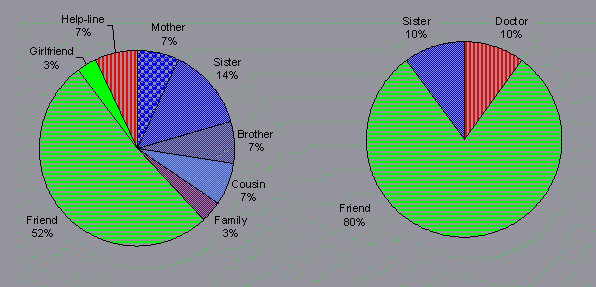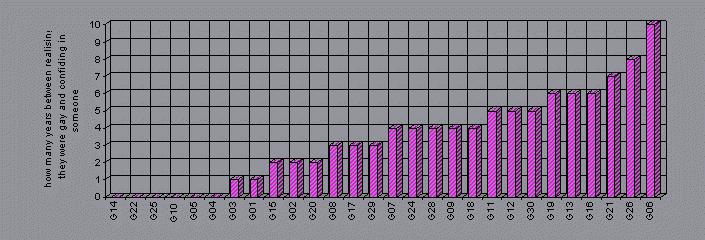
TELLING SOMEONE YOU ARE GAY
For some people telling someone
else was not a help
One woman out of
the six that told someone and two men out of the eight that told
someone when still at school said that the person they spoke to
did not help them.
L1 "The person I spoke to
[Samaritans] didn't seem to think I was gay and kept putting me
off the idea by telling me what a hard life it would be and that
I shouldn't tell anyone until I was sure."
G3 "They [teachers and a
priest] told me that I was wrong. "
Telling their parents
Many gay people do not tell their
parents they are gay for quite some time. The graph below
shows the age by which people had told their parents.
This is a time when their peers are happily exploring their sexual feelings and very often boasting about them to their friends.
The survey asked
the young people whom they first told about their sexuality and
how old they were when they told them. Whom they told
is shown by the pie charts in figure 4 below.

MEN
WOMEN
More interesting
was the time lag between realising they were gay and talking to
someone about it. The girls, on average kept their 'secret'
for one year whereas the boys waited three years. The
actual times the boys waited is shown in the graph below

Most
boys live with the 'secret' that they are gay for about three
years in the middle of their school lives
There is a wide spread of ages but it
is noticeable that most leave it until after they have left
school before they tell their parents.
Also interesting is the fact that 12
out of 31 men had not yet told their parents that they were gay
when they completed the survey.
·
10% of the girls had told their parents by the time they were 16,
·
6.6% of the boys had told their parents by the time they were 16
·
20% of the girls had told their parents by the time they were 18,
·
19.4% of the boys had told their parents by the time they were
18,
This is important because the parents
of young gay people are largely unaware of their children's
sexuality and these parents will therefore be unlikely to feel
that support for lesbian, gay or bisexual pupils by the school is
a high priority.
90%
of girls and 93.4% boys had not told their parents
they were gay by the time they were 16
How parents react
There were a great variety of different
reactions to hearing from their child that they were gay. However
most were supportive.
Negative
reactions 5 girls and
5 boys.
Supportive reactions 3 girls and 14 boys
Denial of the reality of their child
being gay. 2 girls and 1 boy
L9 – "They tried to be
O.K. but said and hoped it was just a phase." - Told
parents when she was 15
G3 - "I was told that it
was just a phase and that I'd grow out of it; it happens to
everybody." - Told parents when he was 15
Upset - 2 girls
L10 - "I told my mum on her
own. We went for a meal and a drink. My girlfriend
was there also, but left before I told her. My mum said,
"No, you're not a gay - you couldn't be. No one in our
family is one!" She blamed it on everything; my
ex-boyfriend for being a bastard; for going to London two years
before that. But she wanted to tell my dad. He said,
"Money is no expense - I will sort it." He wanted
to send me to a doctor who 'cured' gays. (He was) Generally
broken hearted but not angry, at least not to me. I am
their only daughter." - Told parents when she was 21
Angry or Hostile - 1 girl and 4 boys
G13 - "My parents kept it a
secret, (that they knew) because they found out by reading a
letter of mine. My brother told me that they knew and after
that the atmosphere was very hostile. A year later they
still think it's a phase and don't talk about it; they just give
me bitchy comments from time to time." - Told parents
when he was 20
G24 – "[My mother was]
shocked and refused to take it in. She felt that other
people in school had ‘put me up to it’". -
Told parents when he was 17
Initially shocked or saddened but
soon coming round to supporting their child
1 girl and 4 boys
G20 – "My mother cried and
my father packed my bags. But after a big extended family
conference it was accepted and before I knew it my parents were
leaving me to the bus for me to go to Belfast (to the gay scene)
for the weekend, saying, “I hope you have a good time.”
Told parents when he was 17
G5 - "They couldn't
believe it at first but later they didn't mind me being gay as I
didn't practice any gay sex." - Told parents when he was
20
Supportive from the outset - 2 girls
and 10 boys
L4 - "My mother laughed
and told me she already had a fair idea. She then said to
do what made me happy and to be myself because I couldn’t
live a lie." - Told parents when she was 22
G4 - "Actually, from what
I have heard from other gay people, I was very lucky and had a
lot of positive vibes. They knew at 21 I was not trying to
get attention, that I was serious in my views and actions. They
advised me to take care. They both said "You're
still our son and we love you." Actually my mum was
not shocked in the slightest. She clearly remembers me
saying I was gay at 16!!!" - Told parents when he was 21
G26 – "I told my mum while
on the telephone in Scotland. I did not want to face her if
she got angry. She was good over it; only concerned I would
face other people’s prejudice." - Told parents when
he was 21
Parents
may react with shock or sadness but most eventually come round to
supporting their gay children
Stage
4 - Commitment
G28 said "It
made me stronger to face future prejudice. It made me more
determined to stand up for myself and not let any mindless,
ignorant superfluous caveman prevent me from being what and who I
was destined to be. For that, I can be a better person,
proud of myself and my kind."
The next stage in the process of
'coming out' involves becoming being lesbian or gay openly and
recognising that it is a central aspect of, 'who I am', and, 'how
I want to live my life'. Young people begin to feel that
homosexuality is a valid way of life and develop a sense of
contentment with being lesbian or gay. They often have the
experience of falling in love at this time and, perhaps as a
result, feel more confident, fulfilled and able to combat the
social stigma that they may suffer.
At this time some young lesbian and gay
people begin to feel proud of their sexuality. The expression of
this pride in being lesbian or gay is a powerful force in
challenging the stigma attached to homosexuality by people with
prejudiced attitudes and provides positive role models to others
less sure about 'coming out'.
Stage
5 - Synthesis
No respondents wrote anything that would
illustrate synthesis,
The person's sexuality becomes a
natural part of their life and ceases to impinge on their
consciousness. Being gay is no longer an issue. They
get on with their lives as any other well adjusted member of
society does.
CLICK HERE TO RETURN TO THE INDEX PAGE